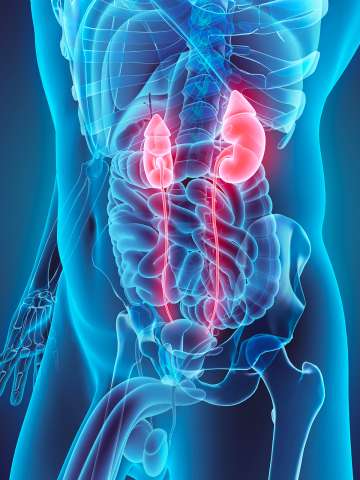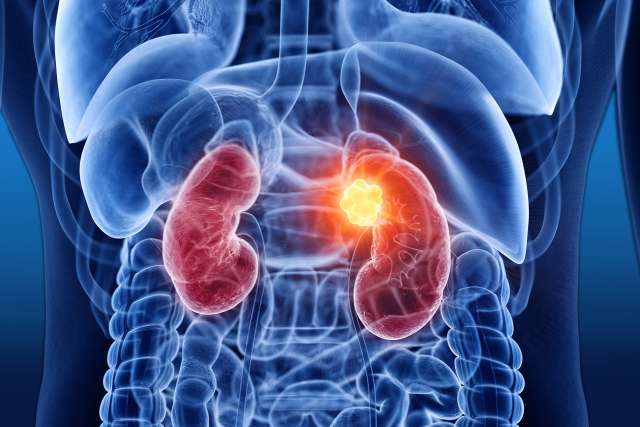Kidney Cancer
Our internationally recognized kidney specialists offer the latest in kidney cancer diagnosis and treatment.

Why choose UCLA Health for kidney cancer treatment?
The UCLA Health Kidney Cancer Program at the Institute of Urologic Oncology is one of the country’s first comprehensive kidney cancer programs. We’ve delivered state-of-the-art care since the launch of the program 40 years ago. At UCLA Health, you’ll find:
Expertise in challenging cases: Hospitals across the region seek expert opinions from our specialists which collaborate daily to ensure comprehensive care for each patient at UCLA Health.
Compassionate care with a team approach: We partner with you and your family in the decision-making process. It’s important to ensure that you have all the information you need to consider your care options.
A team approach: Whether it be in our multidisciplinary clinic or a discussion in our tumor board conference, our kidney cancer providers recognize care is not delivered in a vacuum and work together to offer the best approach to your care.
Leaders in kidney cancer innovation: Our unique research programs have led to refinement of organ-sparing surgery, pioneering immune and targeted agents, and development of advanced diagnostic modalities like the positron emission tomography (PET) scan.
Superior care close to home: UCLA Health offers kidney cancer care with providers at multiple locations across the greater Los Angeles region coordinating diagnostic and treatment plans.
Our services
From kidney cancer diagnosis to post-cancer care, UCLA Health’s Kidney Cancer Program offers comprehensive services, including:
Kidney cancer diagnosis
Our kidney cancer teams are highly skilled in advanced imaging and testing, including:
Ultrasound: A test using high-frequency sound waves to generate images of your kidneys. For select patients, contrast can be given to avoid the use of CT/MRI imaging.
CT scan: A CT scan creates detailed images of your kidneys that are useful in diagnosing cancer. Our kidney CT protocol may allow physicians to predict the type of kidney cancer.
MRI scan: A test that generates highly detailed pictures of your kidneys by using magnetic fields and radio waves. Special contrast is available at UCLA which is safe in patients with kidney dysfunction.
PET/CT scan: A combined nuclear medicine test and CT scan that uses contrast dye and a radioactive material to detect cancer. Various trials use new agents to identify and stage kidney cancer.
Biopsy: A procedure to remove a small piece of kidney tissue and examine it under a microscope to look for cancer.
Cancer genetics
Our hereditary kidney cancer program evaluates the potential genetic causes that increase the risk for kidney cancer. Knowing about a specific genetic risk enables doctors to more precisely tailor a kidney cancer treatment plan that is optimal for you. Learn more about the cancer genetics program at UCLA Health.
Kidney cancers we treat
We treat all types of kidney cancers, including:
Renal cell carcinoma: The most common form of kidney cancer. Renal cell carcinoma starts in the lining of small tubes in the kidneys. Ninety percent of all kidney cancer is renal cell carcinoma.
Renal sarcoma: A rare type of kidney cancer that begins in the kidney’s connective tissues or blood vessels.
Urothelial/Transitional cell carcinoma: A rare (<5%) form of kidney cancer that begins in the urinary drainage/collecting system (renal pelvis and ureter) instead of the kidney itself.
Wilms tumor (nephroblastoma): A childhood cancer that forms in the kidneys.
Kidney cancer treatments we offer
UCLA Health’s Kidney Cancer Program offers leading-edge treatments based on the latest research. These kidney cancer treatments include:
Nonsurgical kidney cancer treatments
Some types of kidney cancer may be treated without surgery using:
Active surveillance: Close surveillance is an option for many small masses that have a low potential to spread.
Radiation therapy: For challenging surgical patients, high dose radiation can be used to control renal tumors or sites of spread.
Immunotherapy: Therapies that stimulate the body’s immune system to attack cancer cells. Many of our patients can have remission after receiving these therapies.
Targeted therapy: These oral medications stop tumors from developing new blood vessels that can help them grow. Targeted therapies typically have fewer side effects than standard chemotherapy treatments .
Tumor ablation: A process that uses extreme heat or cold to destroy a tumor. The UCLA Health Kidney Cancer Program offers cryoablation and radiofrequency ablation under minimal sedation in an outpatient setting.
Clinical trials: Studies of promising kidney cancer treatments that are not yet available to the public. Most patients are candidates for a trial and we encourage participation when appropriate.
Kidney cancer surgery
Surgery is the most common treatment for kidney cancer. Your care team will consider several factors to determine which type of surgery is right for you. They will weigh whether the surgery can remove the cancer, save your kidney and preserve your kidney function. We offer:
- Partial nephrectomy: A surgical procedure to remove the tumor while sparing the kidney.
- Radical nephrectomy: Surgery to completely remove the diseased kidney.
Specialty providers usually choose the procedure based on tumor size, location, kidney function, and overall health. At UCLA Health, surgeons often perform laparoscopy or robot-assisted minimally invasive surgery. These techniques allow us to perform surgery with a high degree of precision.
Meet our team
Our physicians, surgeons and clinical professionals are world-renowned experts in the diagnosis, management and treatment of kidney cancer. We stay on top of the latest research to ensure you receive the best care possible. Our team approach puts more expert eyes on your case, increasing your chances for better outcomes.
Faculty & Providers
Contact us
Call 310-794-7700 to request an appointment with a kidney cancer specialist at UCLA Health.
Find your care
We combine expertise and advanced technology to deliver the best possible outcomes. For more information, connect with a cancer care specialist at 310-794-7700.








